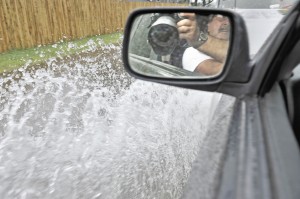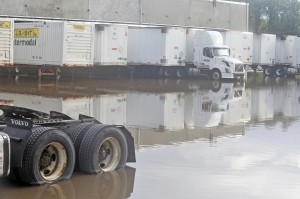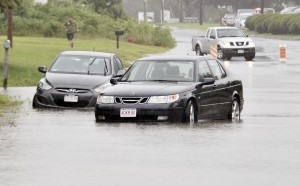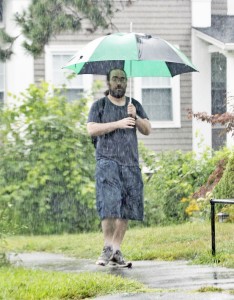
Yesterday’s rain flooded streets and created localized flooding throughout the area. (Photo by Frederick Gore)
WESTFIELD — While communities across the U.S. are drying out after unusually heavy rains swamped highways, flooded basements and were blamed for at least four deaths, Westfield only experienced a few instances of minor flooding.
“I think we’re going to have our typical street flooding, but I don’t expect any major flooding from rivers or streams,” said Westfield Emergency Management Director James Wiggs yesterday morning.

Drivers attempting to load and unload their trailers at this company on South Broad Street in Westfield were tasked with trying to stay out of the water in this parking lot after yesterday’s rain. (Photo by Frederick Gore)
Asked what the potential problems would be, Wiggs said segments of Notre Dame Street and Union Street tend to have flooding issues, but that he didn’t anticipate any traffic issues.
“We’ve done some work to help the drainage there,” he said. “So any time we get heavy rain, those areas tend to puddle a little bit.”
This morning, Wiggs recapped the day and was pleased with how the city’s storm drains held up.

Motorists and business owners along Mainline Drive in Westfield became stranded as heavy rains hit the area yesterday. A state police trooper on the scene said the water was initially up to the front grills of both vehicles which become stranded in the roadway. (Photo by Frederick Gore)
“We had some minor street flooding, but they drained pretty well and cleared up pretty quick. Just another day in the city, basically,” said Wiggs. “We got a lot of rain, but we’ve been doing a lot of work to make our drainage better. Obviously we still have some areas where people have to use caution, but there was nothing I was overly concerned about.”
Wiggs added that the recent dry spell that hit the region would enable the ground to absorb a lot of the rainfall.
Southwick Emergency Management Director Charles Dunlap said that flooding occurred in some areas he hadn’t expected it.
“We had some minor road flooding, no major issues, and some water over the roads where we didn’t expect it. It was a minor surprise,” he said. “We had issues with tree branches on powerlines, too, which contributed to some power outages. We had primary powerlines down along Feeding Hills Road, between Hudson Drive and Garden Terrace, and Fred Jackson Road had a tree branch issue on a powerline.”
Dunlap said the power outages took place from around 11:15 a.m. to 4 p.m., which resulted in businesses losing power and the Southwick Town Library being forced to close.
He said that flooding occurred on both Hillside and Sunnyside Roads, and said that the brooks and streams took a significant amount of the rainwater and remained level.
“I was very much aware of them (brooks and streams). We couldn’t have taken much more rain,” said Dunlap.

A man carrying a large umbrella attempts to stay dry while walking along Court Street in Westfield yesterday. The heavy rain caused localized flooding across the area. (Photo by Frederick Gore)
The latest iteration of wild weather hit the northeast Tuesday night and lingered yesterday. A slow-moving system, powered by tropical moisture and clouds soaring far higher than in usual summer storms, lashed communities from Maryland to New England.
“It’s not just how much rain fell, it’s how fast it fell,” Accuweather senior meteorologist Jack Boston said, calling the storm a once every 50 years event. “We’re talking about billions and billions of gallons of water and it all has to go somewhere.”
The storm formed Tuesday south of Baltimore, according to Accuweather’s Boston, and hit that city with its highest rainfall total in 81 years. Roads were flooded, forcing several water rescues, and a sinkhole formed on an Anne Arundel County street.
From there it swept across New Jersey — following a track similar to a typical winter storm — and dumped nearly 9 inches of rain in Millville, where a woman suffered broken ribs and a punctured lung when the walls of her basement collapsed due to flooding.
Rain fell at a rate of up to 2 inches per hour in Rhode Island, stalling cars and sweeping manhole covers away.

